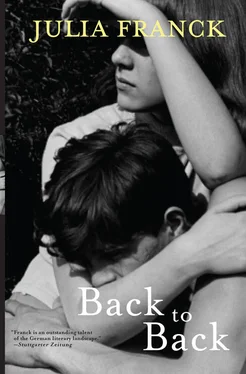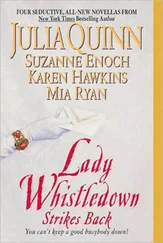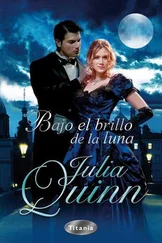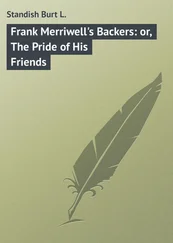In the distance, Thomas heard an explosion, and jumped.
And don’t take fright, there are explosions all the time, small, harmless detonations. Nothing to worry about, we’re all right here.
Thomas nodded again. He took off his helmet. Someone must have taken the box with the explosive away from him. Presumably another man had been sent into the gallery now, someone who knew his way around. Thomas tried to stand up. He reached for the pickaxe leaning against the rock next to him, which he thought must be his. He tried to take a deep breath of air, but there wasn’t any, or so it seemed to him. He mustn’t turn round, that wouldn’t be any help now, he was staggering. He searched his mind for lines of verse that would let him walk forward, go upright. He wanted to cross the bottom of the quarry. The blaze will die down . Perhaps his fear forced him, wouldn’t let his lungs unfold properly, he breathed and breathed, it tumbles and falls . His ribcage was moving up and down, but that wasn’t air, or not the sort he knew from the world above. He saw the other workers climbing out of the quarry. Come on out! Last call, everyone out of the pit! Only the group leader and the explosives expert were busy at the entrance to the chamber. Thomas turned his back to them. He dragged himself towards the pile of stones at the southern end of the quarry. They were lying loose all over the ground there. Debris. Maybe you could breathe without air. Ella had told him that was how she dived. While he kept his head above water swimming in the lake, breaststroke, crawl, never diving down, she would suddenly come up, and she sometimes disappeared for minutes on end in the cloudy water. She claimed that she breathed without air down there, she moved her ribcage so that it rose and fell — it was wonderful down there, she told him how dark it was and how safe she felt, not like an amphibian, like an embryo, a small child rocking in the bosom of the lake as if inside the Great Mother, weightless, aimless, without any responsibility for a word or a direction in which to go. Thomas felt gooseflesh. What Ella had described to him as beautiful, like a dream, made him feel uneasy, oppressed him, made him afraid. He thought as little of the cold as of the darkness falling, he couldn’t get any air. Detonated rock. Reaching the southern slope of the quarry, he crawled behind the heap of stone, he would find peace here, more peace than up with the workers, in the gallery, or above all in the hut among the rowdy boys, his knees and thighs met stone, sharp points bored into his chest, his hands were rough, paws must feel like that, clumsy, with a blunted sense of touch.
Would he have completed his mission with gloves on? He would rather feel the stones than the dulled, sweaty, leathery inside of gloves that left his hands with an animal smell. He didn’t mind if the stone roughened his skin, he picked up fragments large and small, he collected every stone that came to hand. Did quartzite like this have inclusions? If so, what were they? The fine rain was falling harder. The ground shook. Stone thundered, explosive force discharged the tension of stone in his ear. Thomas lay still on his stomach on the floor of the quarry, his view of the explosives chamber was blocked by the heap of stones, he was safe here. He felt the quivering, the breathing of the stone against his diaphragm. The explosives expert and the group leader had set off the charge. Rain pattered down on Thomas.
More rumbling, the earth around him was shaking, small explosions, nothing dangerous, of course, far, near, the stone preserved him, sand filled the air, gummed up his eyes, his nostrils, he had to cough, he would suffocate on the sand, on the darkness, turn to stone.
Dragonflies glittered under the willow tree, glowing red ones; where the branches bowed down, the sunlight from the Fliess shone up on the slender leaves; a swarm of red and blue, gleaming blue dragonflies; Michael lay beside him, his hair tickled, Michael’s delight laughed in his ear, his hand touched Thomas’s, the sun flashed in their bodies and eyes. I’d like to know, said Michael, his voice becoming one with Thomas’s. His own thought in Michael’s words and mouth, his own curiosity on his friend’s lips.
His chest was burning. His mouth felt rough with sand, he heard his own rare heartbeat in his ear as it lay on the stone, his head motionless; he rolled a small stone fragment out of his mouth with his tongue. From somewhere, desired by all, / A spark kindles the shadow. / The light rises, reaches out. Thirst tormented him. So much that the darkness sank away. He tried to move his toes, and didn’t stop until the tingling in his calves and legs showed him that he was alive; he took slow, shallow breaths. Hadn’t that man been right? All harmless little explosions, nothing would happen here. If he stayed lying where he was weeks could pass before anyone thought of looking for him. How long had he been lying there? Boundless thirst. Beneath him, on his stomach and near the burning pain, he felt something wet in his navel, on his ribs. He knew he hadn’t pissed his trousers, not that. When he could move his arm, he pushed it under his body, felt the moisture and the water bottle. For some reason unknown to him, its contents had poured out between him and the rock. Be brave, hadn’t his mother said that when she noticed his hesitation, fearing failure even before he could fail? The only way to defy the cold and darkness was to move. Now he wiggled his toes and stretched his legs, pushed them forward and back until the tingling died down. The working clothes rubbed his skin, the burning pains were coming from the side of his chest, under his arm, no way of moving forward without pain, pain even in silence. Thomas stopped and waited, motionless, he listened to sounds, distant noises. He heard no voices. The men must have knocked off work by now. Friday evening, many apprentices had gone home. And if home was too far away, they went to the Wasserburg and the secret meeting place among the dunes. Thomas did not want to go for walks, nothing attracted him to the Wasserburg, indeed he was frightened of its female inmates. And on no account did he want to come upon men and girls among the rainy, wet dunes. He spent the weekend in the hut, hoping that when the other lads came back they would have forgotten about the test of courage and the header that he hadn’t yet taken into the shallow lake.
Ella leaned back against the stove. She was wearing two pairs of trousers, one on top of the other, a pair of long johns, two pairs of woollen socks and a cardigan over her sweater. The time when she was afraid of drying up was over. The thermometer showed that the temperature in the room was fifteen degrees, and it would probably rise higher. Before Käthe went away she had turned off the heating in the cellar and locked the door. She must have taken the key with her; at least, Ella hadn’t found it anywhere. Käthe suspected Ella of wasting heating oil behind her back. Suitcase in hand, pilot’s cap on her head, Käthe had said that if Ella really felt too cold she had better heat one of the stoves. It was indeed too cold, and had been for some days. But obviously Käthe had also hidden the key to the coal cellar, which proved impossible to find. A week after Käthe left, Ella had written a letter to the Walter Ulbricht Leuna Works, asking Käthe to write to her or phone her and tell her where the key was. But there was no reply yet; the post could take a week. Maybe all mail was opened by the manager of the works before being passed on to its recipients? Maybe Käthe simply didn’t want to answer the letter. She hated requests and begging letters. She thought Ella was not just a parasite but a thief as well. Ella’s request for the key to the coal cellar might seem presumptuous to her. It wasn’t easy to make it sound respectful enough and yet as casual as possible.
Читать дальше












